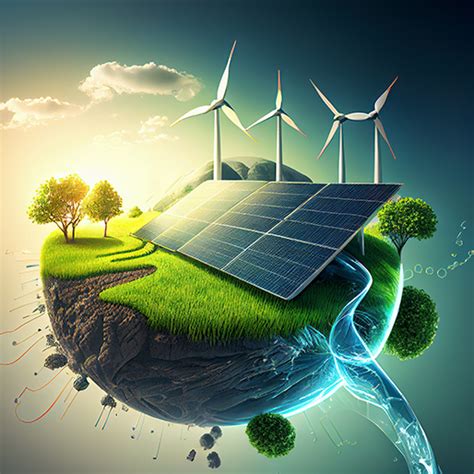The world is shifting towards a more sustainable future, and clean tech jobs are at the forefront of this transition. As concern for the environment grows, the demand for professionals in the clean tech industry is increasing exponentially. Clean tech, short for clean technology, refers to the use of technology to reduce environmental impact and promote sustainability. From renewable energy to green infrastructure, clean tech encompasses a wide range of innovative solutions that are transforming the way we live and work.
The clean tech industry is not only crucial for the health of our planet, but it also presents a significant economic opportunity. According to the International Renewable Energy Agency (IRENA), the renewable energy sector alone could support up to 46 million jobs globally by 2050. This growth is driven by the increasing adoption of clean technologies, declining costs, and government policies supporting the transition to a low-carbon economy.
The Benefits of Clean Tech Jobs
Clean tech jobs offer numerous benefits, not only for the environment but also for individuals and communities. Some of the advantages of pursuing a career in clean tech include:
-
Job Security and Growth Opportunities
Clean tech is a rapidly growing industry, with new job opportunities emerging every day. As the demand for sustainable solutions increases, the job market is expected to expand, providing a high level of job security and opportunities for career advancement.
-
Competitive Salaries and Benefits
Clean tech jobs often come with competitive salaries and benefits, including health insurance, retirement plans, and paid time off. Many companies in the clean tech industry also offer additional perks, such as on-site fitness centers, free meals, and professional development opportunities.
-
Personal Satisfaction and Fulfillment
Working in clean tech can be incredibly rewarding, as professionals in this field have the opportunity to make a positive impact on the environment and contribute to a sustainable future. Many clean tech professionals report feeling a sense of personal satisfaction and fulfillment in their work.
-
Diverse Career Paths
The clean tech industry encompasses a wide range of career paths, from engineering and research to policy and finance. This diversity of career options allows individuals to choose a path that aligns with their skills, interests, and values.

Clean Tech Job Roles and Responsibilities
The clean tech industry encompasses a wide range of job roles and responsibilities, including:
-
Solar and Wind Energy Engineers
Solar and wind energy engineers design, develop, and implement renewable energy systems, including solar panels and wind turbines.
-
Sustainability Consultants
Sustainability consultants work with companies and organizations to develop and implement sustainable practices, including energy-efficient systems and waste reduction strategies.
-
Green Building Architects
Green building architects design and develop sustainable buildings, including homes, offices, and public buildings, using environmentally friendly materials and energy-efficient systems.
-
Energy Efficiency Specialists
Energy efficiency specialists work with companies and individuals to identify and implement energy-saving opportunities, including energy-efficient lighting and HVAC systems.
-
Environmental Scientists
Environmental scientists conduct research and develop policies to address environmental issues, including climate change, air and water pollution, and waste management.

Education and Training for Clean Tech Jobs
While a degree in a specific field is not always required for clean tech jobs, many employers prefer candidates with a background in a relevant field, such as engineering, environmental science, or sustainability. Some common educational paths for clean tech professionals include:
-
Bachelor's Degree in Engineering or Environmental Science
A bachelor's degree in engineering or environmental science can provide a strong foundation for a career in clean tech.
-
Master's Degree in Sustainability or Renewable Energy
A master's degree in sustainability or renewable energy can provide advanced knowledge and skills in clean tech, including policy, finance, and project development.
-
Certifications and Training Programs
Certifications and training programs, such as the Certified Sustainability Practitioner (CSP) or the LEED AP (Leadership in Energy and Environmental Design Accredited Professional), can provide specialized knowledge and skills in clean tech.

Challenges and Opportunities in Clean Tech
While the clean tech industry presents many opportunities, it also faces several challenges, including:
-
Policy and Regulatory Frameworks
The clean tech industry is heavily influenced by policy and regulatory frameworks, which can create uncertainty and barriers to growth.
-
Public Perception and Awareness
Public perception and awareness of clean tech can be limited, making it challenging to build support and drive adoption.
-
Cost and Financing
Clean tech solutions can be expensive, making it challenging for individuals and companies to access financing and implement sustainable practices.
-
Technological Advancements
The clean tech industry is rapidly evolving, with new technologies and innovations emerging every day. This can create opportunities for growth and development, but also presents challenges for companies and individuals to keep pace.

Gallery of Clean Tech Images






What is clean tech?
+Clean tech, short for clean technology, refers to the use of technology to reduce environmental impact and promote sustainability.
What are some examples of clean tech jobs?
+Some examples of clean tech jobs include solar and wind energy engineers, sustainability consultants, green building architects, energy efficiency specialists, and environmental scientists.
What education and training are required for clean tech jobs?
+While a degree in a specific field is not always required for clean tech jobs, many employers prefer candidates with a background in a relevant field, such as engineering, environmental science, or sustainability.
In conclusion, clean tech jobs offer a wide range of benefits, from job security and growth opportunities to personal satisfaction and fulfillment. As the demand for sustainable solutions continues to grow, the clean tech industry is expected to expand, providing new career paths and opportunities for professionals. Whether you're just starting out or looking to transition to a new field, clean tech jobs are definitely worth considering.
